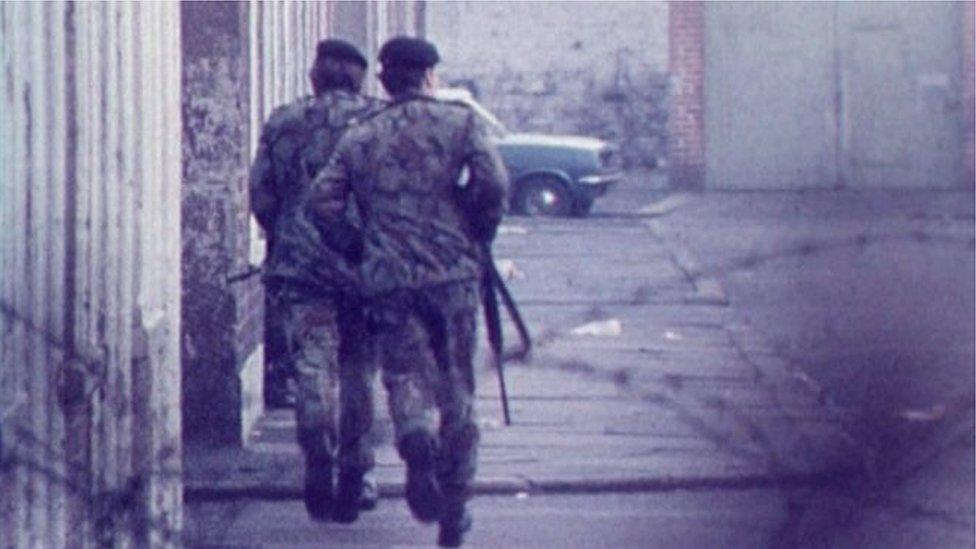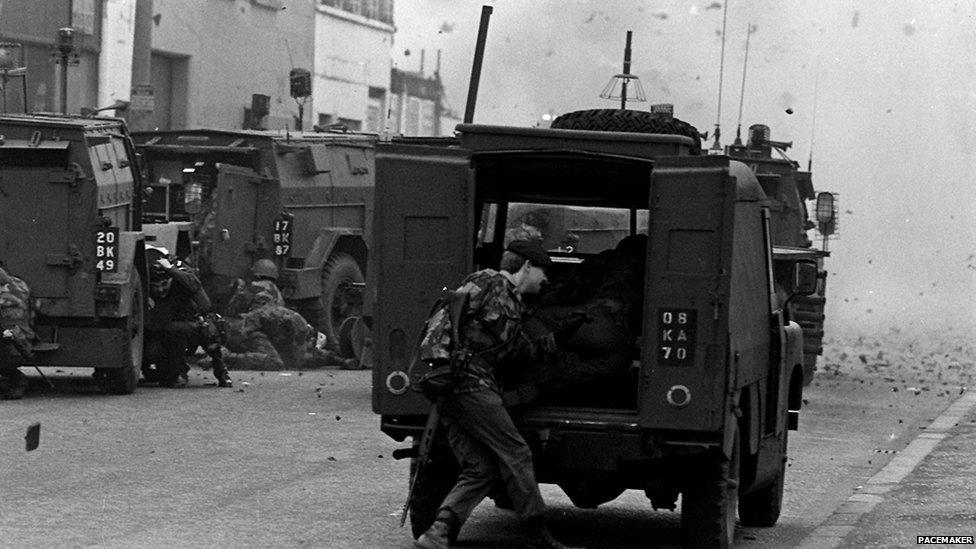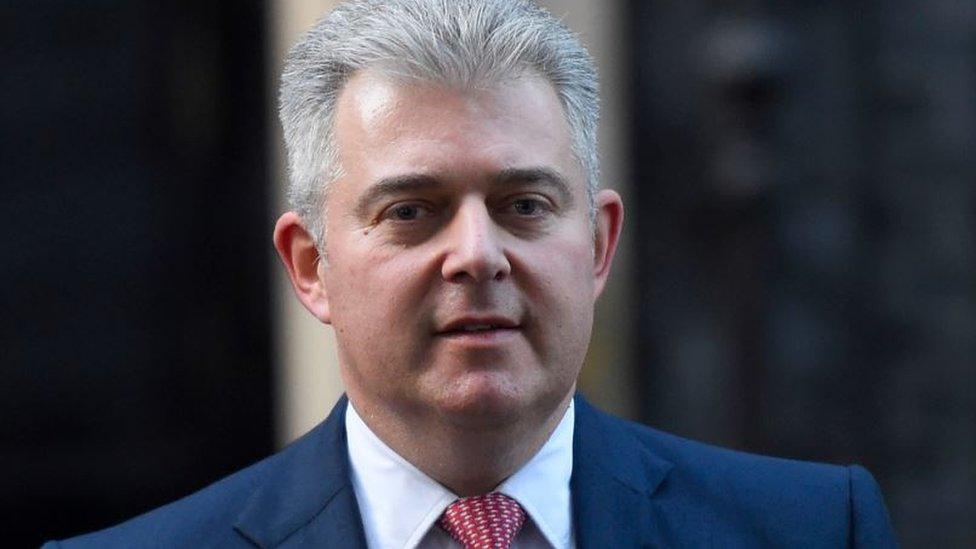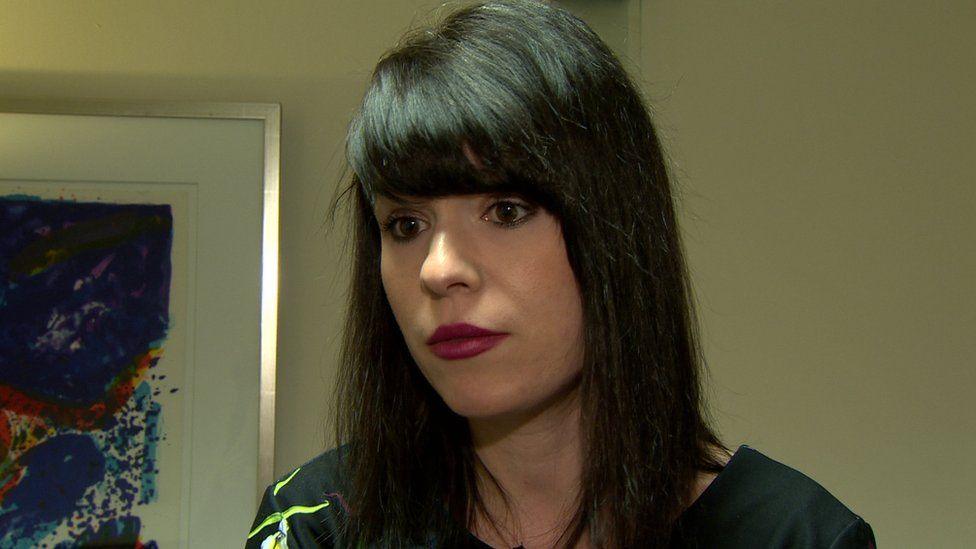Troubles: Unilateral move by UK on veterans would 'breach trust'
- Published

It is understood the proposed legislation would see limits placed on prosecutions for offences committed before the signing of the 1998 Good Friday Agreement
Taoiseach (Irish PM) Michéal Martin has warned the UK that any unilateral move around Troubles-related prosecutions of veterans would be a "breach of trust".
It comes amid reports that the UK intends to ban future prosecutions of British soldiers who served in Northern Ireland.
It has been reported that the move would also apply to former paramilitaries.
The plan has also sparked anger from politicians in Northern Ireland.
The Daily Telegraph, external and The Times, external reported legislation will be announced in the Queen's Speech on Tuesday.
The Irish government said it "strongly advised" the UK not to take "unilateral action on sensitive issues".
Mr Martin added: "For us the victims are the priority and the victims will remain the priority."
A UK government spokesperson said it had "clear objectives for addressing the legacy of the Troubles".
It is understood the proposed legislation would see limits placed on prosecutions for offences committed before the signing of the 1998 Good Friday Agreement.
The reports were leaked on the eve of polling day for elections in England, Scotland and Wales.
Sinn Féin president Mary Lou McDonald said the move was an "attack on the rule of law".
She said what the British government was doing was "an attempt to put British soldiers above the law and prevent investigations into murder, torture, shoot to kill and collusion involving British forces in Ireland".
"Let's be clear, this is not about dealing with the legacy of our past, this is about continuing the decades long cover-ups and frustrating families in their efforts to get truth and justice."
'Blanket amnesty'
DUP MP Gavin Robinson said it was "appalling" the proposal had been released to the media, and his party had not been given any of the detail.
"I would say I have some concerns about what I have read today," he said.
"You know our position, we are against an amnesty. There should not be an amnesty, there should be no evaporation of justice for victims out there."
He said his party "will want to see very quickly from the government what they are planning to do" and that the proposed move was "a cop out".
SDLP leader Colum Eastwood said he plans to speak to the British and Irish governments later, adding the plan would over run the 2014 Stormont House Agreement, which included proposed measures to deal with the past.
He described the reported plans as "the biggest betrayal of victims by the British government" and said it would "put a huge obstacle in the way of true reconciliation".
"It is the most shabby government I have ever come across, they are so cynical and so untrustworthy, I don't think anybody would trust them," Mr Eastwood told BBC Radio Foyle.
"Society needs to move on but on the basis of truth and justice. You cannot do it by hiding the past and this government is more concerned with backbench Tory MPs with military constituencies than actually looking after the victims of the past."
He added the current government was "the most unprincipled and cynical" in many years.

'This was the direction of travel'

I don't think we should be surprised by this development.
It was the direction of travel that the government has been on since March of last year when it announced that it wanted to shut down the majority of investigations, close them, for good.
This was the mechanism by which the Conservative Party would honour its manifesto commitment to end prosecutions of veterans who served in Northern Ireland.
What has become clear over recent weeks is that in order to do this, the government would have to apply some type of mechanism across the board.
So, as well as restricting or banning further prosecutions of veterans, this new piece of legislation would mean former paramilitaries would not be prosecuted either.
It remains to be seen what will emerge by way of legislation.

Ulster Unionist Party (UUP) MLA Doug Beattie said this was an amnesty for all.
"Everybody will get away with this. This is a line under the sand," he said. He said the UUP was not in favour of an amnesty.
The legislation was also criticised by the Alliance Party leader, Naomi Long, who said on Twitter that the lack of communication on it "typifies the contempt with which Govt are treating victims".
Traditional Unionist Voice (TUV) leader Jim Allister said that if the reports are correct, "then amnesty for terrorist murder is shamefully on its way".
"Amnesty for terrorists in the tailwind of action to protect veterans is not acceptable, either by reason of the equivalence it embraces or the disproportionate advantage to terrorists," he said.
In Dáil Éireann (Irish parliament) on Thursday, Mr Varadkar said the reports "fly in the face" of both the Stormont House Agreement and New Decade, New Approach.

"It's something that we will not support as a government. We support the victims," Mr Varadkar said.
"We stand with the families bereaved and damaged as a consequences of these actions. They have a right to know what happened. They have a right to justice, regardless of whether the murderers were British soldiers, republicans or loyalists."
Northern Ireland Veterans' Commissioner Danny Kinahan said the reports contain nothing new from what was previously reported on UK government plans to deal with the past.
He said veterans wanted clarity on what would happen regarding potential cases involving them.
"An amnesty is a really hard one for everybody. If you can't investigate why are we spending fortunes on lawyers to get no prosecutions?," he said on Good Morning Ulster.
"We should be concentrating on the families and reconciliation and finding a way forward instead of taking things to court."
In a statement on Thursday night, he said the collapse of the trial of soldiers A and C this week was proof that the system did not work.
He said veterans wanted an end to the "moral equivalence" between themselves and those who carried out terrorism.
"I want to see veterans treated with the respect they deserve, as they bore the brunt of terrorism and all its horrors, and did so on behalf of us all," he added.
Secretary of State for Northern Ireland Brandon Lewis met Irish Foreign Minister Simon Coveney on Wednesday in Dublin.

Secretary of State for Northern Ireland Brandon Lewis met Irish Foreign Minister Simon Coveney on Wednesday in Dublin
A spokesman for his department confirmed that Mr Coveney was given no advance knowledge of any such proposal.
In a statement, the Irish government added: "We reiterated that only through a collective approach can we deal with these issues comprehensively and fairly in a way that responds to the needs of victims, survivors and society as a whole.
"Victims and their families are the only priority."
A UK government spokesperson added: "We want to deal with the past in a way that helps society in Northern Ireland to look forward rather than back.
"It is clear to all that the current system for dealing with the legacy of the Troubles is not working for anyone, failing to bring satisfactory outcomes for families, placing a heavy burden on the criminal justice system, and leaving society in Northern Ireland hamstrung by its past."
'We've tried that'
Speaking on BBC NI's The View, former victims' commissioner Judith Thompson said the a move would bring more legal challenges, and more suffering.
"Everybody, including victims and survivors, want to move forward into a better future," she said.
"But you don't deal with something by saying 'that's it, line drawn'. We've tried that again, and again. It does not work.
"You need due process that actually engages with families, shows them that someone cares to properly investigate the truth of what happened to them."

Amnesty International's Grainne Teggart says the proposal is an insult to victims
Amnesty International said no one can be above the law or beyond accountability.
"This reported plan is an insult to victims on all sides and the latest gross betrayal of victims who remain determined to seek the truth, justice and accountability to which they are entitled," said Grainne Teggart, the organisation's Northern Ireland campaign manager.
"We urge the government to abandon this offensive plan and revert to the UK's commitments to deliver mechanisms capable of vindicating the rights of victims."
Four former soldiers who served in Northern Ireland during the Troubles are currently facing prosecution.
In 2019, the Public Prosecution Service (PPS) in Northern Ireland said of 32 "legacy cases" it had ruled on since 2012, 17 related to republicans, eight to loyalists, and five were connected to the Army.